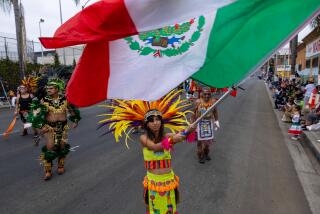Why Do We Need Ethnic Studies?
The Coalition for Chicano and Chicana Studies, an organization that works to have Chicano studies taught in public schools, believes that Hispanic Heritage Month and Cinco de Mayo should not be the only times during the year that Latino children are exposed to their ethnic culture. MAURA E. MONTELLANO spoke with a member of the coalition.
The need for Chicano studies at the K-12 level is very great. In California, there are approximately 2 million Chicano/Latino students, but only about 25,500 Chicano/Latino teachers to serve these students. In terms of role models and people who understand the life experiences and the community, there is a dire need for teachers who can relate to these children.
There are only nine classes teaching Chicano studies in the LAUSD out of 50 high schools and 74 middle schools. According to the district, in the elementary level there are no classes specifically in Chicano studies; only in grades three and four do they mention anything of the Chicano experience. The emphasis in the elementary level is multicultural and does not specifically address the Chicano-Mexicano experience.
On the secondary level, the only time these courses are taught is usually in the 9th grade. It’s an elective and not required. In 1983, a Senate bill eliminated electives. The state, through this bill, required more English and math, so it eliminated many electives. There should be some legislation to require that a course be developed.
Chicano studies is important because it’s the study of the experience of the Mexicano people; specifically, it addresses the social, political, cultural and economic conditions of the Chicano/Mexicano people. It’s important for the students to learn this because we are witnessing a heavy emphasis on the sciences, math, physics, technology. We shouldn’t be putting all our faith in technology and science. We’re seeing a negation of the social sciences where people have to know the people, the culture, the issues of language, class and gender. It’s very important in any school and university that people interact.
Some would say that Chicano studies eliminates other people. I don’t see it in terms of discrimination; I see it as inclusion. If you have a people who have been on this continent for hundreds of years, who have contributed greatly, who have a culture and a people, they should have a right to have their history and their people be studied. Chicano studies is a community commitment that all people can benefit from.
More to Read
Sign up for Essential California
The most important California stories and recommendations in your inbox every morning.
You may occasionally receive promotional content from the Los Angeles Times.









